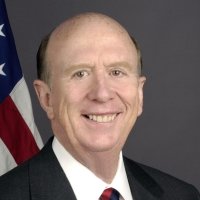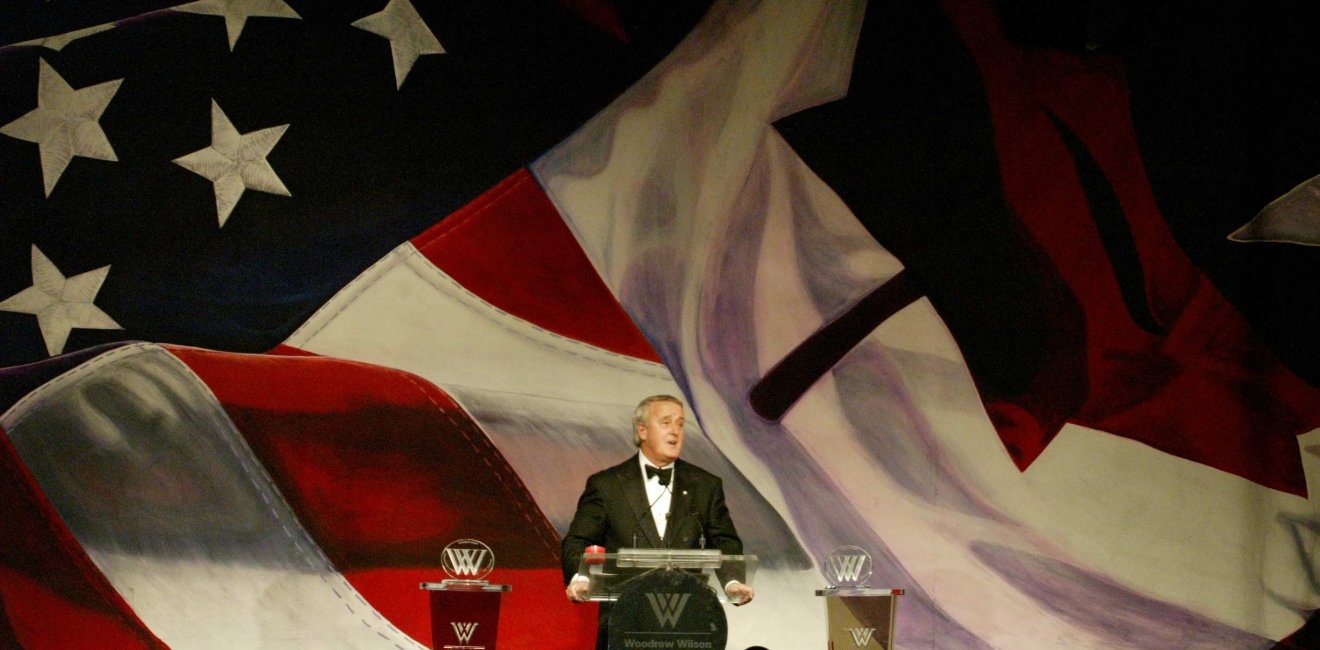On February 29, 2024, former Canadian Prime Minister Brian Mulroney passed away at the age of 84. During his tenure at the helm of Canada's government, Mulroney advanced trade and environmental policies that are still impacting the Canada-US relationship forty years on. Among the many accolades he received in his career, Mulroney was awarded a Woodrow Wilson Award for Public Service in 2003. In this collection, Canada Institute experts reflect on his extensive legacy.
My Perspective on Prime Minister Brian Mulroney
Hon. David H. Wilkins
Advisory Board Member, Canada Institute; Former Ambassador of the United States to Canada
It felt colder than usual that December day in 2005. I had just endured a Canadian press “scrum” and was flying out of Toronto Pearson. As I walked the concourse, there was my face on every television and fronting the covers of all the newspapers.
And it wasn’t good.
The day before I had challenged then-Prime Minister Paul Martin’s campaign criticisms of the United States. To say the speech was not received well in some quarters is an understatement, and as I waited on my flight back to Ottawa, I fielded dozens of calls from people eager to hammer me.
So when the phone rang yet again, and I was asked to “hold for Brian Mulroney” I braced myself for more criticism.
Instead, that call was – and remains – one of the top moments of my life. Mulroney knew I was taking hits, and as one who had absorbed many hits, Mulroney reached out personally to encourage and inspire me.
He changed my perspective on criticism and put wind beneath the wings of a new ambassador eager to learn the job and do it well.
I am indebted to him for that kindness, and so many he and Mila granted Susan and me over the years.
I once had the privilege of enjoying a long and private lunch with Brian at his law firm in Montreal where he regaled me with stories of my hero, Ronald Reagan, and his dealings with a bevy of historical figures including Margaret Thatcher, the Bush and Clinton families, Princess Diana, and seemingly every larger-than-life leader on the world stage. He spoke of hard fights and devastating political costs, but never once of political enemies. In more than two hours of conversation which he carried virtually by himself, he expressed animus toward none.
It occurred to me then how Brian Mulroney was different than most. He left political battles on the field and wasn’t one to settle old scores. He loved to give big speeches, get lots of laughs and command attention, but he didn’t wilt away from the spotlight. He understood he was a controversial figure and trusted his legacy to history.
He had perspective.
President Ronald Reagan once said, “I've always believed that a lot of the trouble in the world would disappear if we were talking to each other instead of about each other.”
I like to believe Reagan was thinking of his good friend Brian Mulroney.
In 2008, at my request, Brian graciously traveled to South Carolina to address a major state legislative dinner. In true Mulroney fashion, he kept us laughing and challenged us to do the hard things without becoming hard.
He knew it could be done because he did it.
The Importance of Mulroney’s Free Trade Legacy, and the Precedent it Sets for Today
Danielle Goldfarb
Global Fellow, Canada Institute
Imagine if Canada did not have a free trade agreement with the United States. It is almost unfathomable today to imagine this possibility, despite the deal being so controversial in Canada at the time. Without Prime Minister Brian Mulroney’s successful completion of a free trade agreement with the United States - and later the NAFTA - Canadian living standards would be far worse than they are today.
Canada has a small, open economy, located next door to the world’s largest. The Canada-US Free Trade Agreement, the NAFTA, and now the CUSMA provided and continue to provide Canadian businesses with secure and relatively free access to the much larger US market. The agreements also made it relatively more attractive for companies to locate part of their supply chains in Canada, as part of regional supply chains. And without the deals, it is hard to see how Canada would have been able to mitigate the impacts of crises such as the 9/11 attacks and their impact on border security, or Donald Trump’s tariff threats during the 2016 presidency.
The tremendous importance to Canadian interests of these deals cannot be overstated.
And they have led to widespread acceptance among Canadians. Canadians today understand that free trade with the United States and Mexico (and also with others) is essential for this country’s prosperity, and does not pose a threat to Canadian independence.
Moreover, the deals established frameworks, precedents, and cross-border working relationships that arguably matter even more today during this moment of geopolitical and technological disruption.
When Mulroney negotiated the original agreement, he likely never imagined the degree to which China would be integrated into the global economy, or how much of our economic activity would be conducted online. So many things have changed. We are now in the midst of a digital data and AI revolution. We face considerable uncertainty, including the 2024 election and its aftermath, Donald Trump’s new threat of sweeping tariffs, the fact that China, Russia, and India play by a different set of economic and political rules than do the NAFTA countries, and new threats to global supply chains from actors such as Yemen’s Houthis.
Despite so many differences between now and then, the free trade deals provide an anchor and starting point for the three countries to navigate the many challenges we face together in this moment. We would be far worse off without that anchor.
Reminiscences of Canadian Prime Minister Brian Mulroney
Hon. Earl Anthony Wayne
Public Policy Fellow, the Wilson Center; Career Ambassador (Ret.) to Afghanistan, Mexico, and Argentina
Brian Mulroney was a great supporter of the US-Canada partnership and of the North American Free Trade Agreement. The United States owes him many thanks for his steadfast collaboration as we built stronger bilateral collaboration, and to create new jobs and generate more prosperity for both countries and across North America. Though I did not know him well, I had several memorable opportunities where our paths crossed.
Prime Minister Mulroney had a warm relationship with President George H.W. Bush, which I learned when working on President Bush's National Security Council Staff covering Canada and Europe in 1990-91. My NSC colleagues and I commented on how friendly and trusting the conversations were between the Prime Minister and the President. They often exchanged stories about politics and joked with each other.
I still remember clearly taking notes for one phone call where President Bush was wishing Prime Minister Mulroney well as he was passing through some challenging times in Canadian politics, and the Prime Minister responded by saying something to the effect of "well, George, you know more people in Canada today think Elvis is still alive than support me as Prime Minister," but then added right away that he was committed to keep working with President Bush to see the ongoing North American trade negotiations to achieve successful results as well as to keep working take full advantage of the opportunities to solidify the openings to bring more freedom, democracy, and security to Europe. It was clearly a conversation between two friends who shared common objectives and a determination to make as much progress together.
The next opportunity that I had to interact with Prime Minister Mulroney was many years later in 2018. We were both invited to testify in a US Senate hearing about the importance of preserving the achievements of the North American Free Trade Agreement (NAFTA), which were being questioned by the Trump Administration.
First, the Prime Minister was gracious and friendly to all, including warmly responding when I reminded him of my work for President Bush many years later. He was happy to share stories and insights with me and former Mexican Trade Minister Jaime Serra as we waited for the hearing to start.
Then, Mr. Mulroney gave an enthusiastic and compelling testimony about the values that tied the United States and Canada together and the economic progress that had been made possible because of NAFTA for the US, Canada, and Mexico.
While I gave a fact-filled and detailed focused testimony and responses to the Senator's questions, Prime Minister Mulroney very effectively talked to the senators as a fellow politician about creating jobs and supporting companies in their states, all of which he argued was made possible by NAFTA. Mr. Mulroney had well chosen facts about how individual US states were benefiting from NAFTA trade and investment to drive home his comments to the Senators. It was a pleasure to see him in action and an honor to join the Prime Minister in that Senate testimony.
Brian Mulroney's Gift to Future Generations
Xavier Delgado
Associate, the Canada Institute
When I was born just before the turn of the millennium, Brian Mulroney had been out of government for over of six years. Growing up in Vancouver, I spent no time thinking of bilateral trade opportunities; instead, I spent my adolescence as a blissfully ignorant beneficiary of the policies and initiatives that Mulroney championed during his time as prime minister.
In reflection, it is difficult to overstate the impact of Brian Mulroney’s premiership on all Canadians, even those born well after his time in office.
Regional free trade as we know it today sprouted from the North American Free Trade Agreement (NAFTA) he helped negotiate, which itself was preceded by the equally groundbreaking Canada-US Free Trade Agreement (CUSFTA) signed and implemented by the Mulroney and Reagan administrations. While the contemporary consensus around bilateral Canada-US trade is overwhelmingly positive, it faced notably stronger opposition in Canada upon its initial introduction in the 1980s. The opposition Liberal Party and the New Democratic Party warned that a free trade agreement with the United States would erode Canadian sovereignty, with Liberal leader John Turner proclaiming that the CUSFTA would “reduce [Canada]… to a colony of the United States.”The national debate was so intense that the Canadian election in 1988 focused primarily on the question of free trade.
When the Progressive Conservative Party won a ruling majority, it swiftly passed legislation to implement the CUSFTA. Five years later, the agreement was superseded by NAFTA.
Americans and Canadians born in my generation and beyond have never lived in a world without North American free trade. Canada consistently ranks among the United States’ top trading partners and has helped foster cross-border industries that extend from manufacturing to energy and beyond. The concept of free trade between Canada and the United States is so widely embraced today that it is often taken for granted.
Canada and the United States are entering a consequential period. Both countries will face elections in the coming 18 months, followed shortly after by a mandated review of the US-Mexico-Canada Agreement (USMCA) in 2026. Concurrently, both countries are rethinking supply chains in the wake of the COVID-19 pandemic and seeking opportunities to nearshore manufacturing for goods such as semiconductors and batteries within North America.
Brian Mulroney’s legacy will extend long after the impressive surge of fond reminiscences in the wake of his passing. We would do well to remember that the bilateral trade relationship we enjoy today came at significant risk borne by Mulroney and his government. The decision to persist in the face of intense national skepticism was an act of political courage with enduring impacts on the Canada-US relations. Indeed, if one agrees that trade relations are the backbone of the special relationship, then Brian Mulroney is one of the most consequential Canadian leaders of all time.
Brian Mulroney's Environmental Advocacy: of Stars, Lakes, and Acid Rain
Deanna Horton
Global Fellow, the Canada Institute
While I had met Prime Minister Mulroney on several occasions, and had spent time with him in Japan in 1991, his longstanding impact did not become apparent to me until much later.
In 2016, I organized a session in Toronto with former chiefs of staff to Prime Ministers, including Mulroney’s Hugh Segal. Segal talked about Mulroney’s well-known quote about world leaders never turning to their spouses and asking "I wonder what Canada is up to today?". He then encapsulated Mulroney’s attitude as “It's my job to scan global events to see where Canada can be inserted, where I can play a role on Canada's behalf, so that there are IOUs I can use on trade, consular problems, acid rain, or defence that can help Canada.'"
Mulroney’s dedication was underlined further through an exercise I conducted that same year with junior fellows at Massey College at the University of Toronto which used acid rain as the basis for a crisis simulation. Mulroney was the apex of what Corporate Knights founder Toby Heaps called the “Acid Rain Formula”, arguably still one of the most compelling examples of advocacy at the highest level. Mulroney credits his relationship with George H.W. Bush, starting when he was Vice-President, such that by the time he was elected President in 1988 “he knew the acid rain file better than any of his officials” and when he travelled to Ottawa in February, 1989, he told Mulroney of this “determination to move forward with setting limits (on acid rain pollutants) with legislation and then moving to a discussion with Canada leading to an accord that I think will be beneficial to both countries”. In an address to a Joint session of Congress in 1988, Mulroney said, “We are reducing our emissions by 50 percent. We ask nothing more than this from you. What would be said of a generation of Americans and Canadians who found a way to explore the stars but allowed their lakes and forests and streams to languish and die?”
The graduate students who participated were no doubt impressed with this very rare inspiration and commitment from the highest level of government.
A Prime Minister and his Community Focus on Airports
Vancouver Airport Authority
Advisory Board Members, Canada Institute
Under the Mulroney regime, the transfer of the first 4 Local Airport Authorities were transferred to local control in 1992 and Vancouver Airport Authority may not have existed in its present form without this major shift in airport governance policy.
In the mid-1980s there was a move to create a Canadian Airports Authority (CAA) modeled on the British Airports Authority crown corporation. Transport Canada had reorganized CATA (The Canadian Air Transportation Administration, similar to the FAA), and took airports out of CATA to create the Airports Authority Group in preparation for transition to a crown corporation. McKinsey and Company was hired to evaluate whether the local airport authority model or a national CAA should be pursued. The McKinsey report recommended transitioning to a national Airports Authority to gain commercial experience as a first step, and then moving to privatization of airports over time. The Mulroney Government rejected that option and went ahead with the transfer of federal airports to airport authorities where there was strong community interest to take on local control.
So, while Brian Mulroney is remembered for many major policy achievements, like the Canada-US Free Trade Agreement, we owe our existence as Vancouver Airport Authority to the Mulroney legacy.
One of the Greatest Prime Ministers in Canadian History
Jean Charest
Former Premier of Quebec; Former Mulroney Cabinet Minister; Advisory Board Member, Canada Institute
Mr. Mulroney was one of the greatest prime ministers in Canadian history. He was an exceptional leader. A visionary. And a statesman whose influence had a significant impact on the international stage. I remember him as generous, passionate, and deeply attached to Canada. Our country owes Prime Minister Mulroney a profound debt of gratitude.
Contributors

Partner, Nelson Mullins Riley & Scarborough LLP; Former U.S. Ambassador to Canada

Senior Fellow, Centre for International Governance and Innovation; Distinguished Fellow, Asia Pacific Foundation of Canada

Former Career Ambassador to Afghanistan, Argentina, and Mexico; Distinguished Diplomat in Residence, School of International Service, American University

Research Director, Washington Forum on the Canadian Economy

Distinguished Fellow, Munk School of Global Affairs and Public Policy, University of Toronto

Partner, McCarthy Tétrault LLP; Former Premier of Québec

Canada Institute
The mission of the Wilson Center's Canada Institute is to raise the level of knowledge of Canada in the United States, particularly within the Washington, DC policy community. Research projects, initiatives, podcasts, and publications cover contemporary Canada, US-Canadian relations, North American political economy, and Canada's global role as it intersects with US national interests. Read more

Explore More
Browse Insights & Analysis
360° View of How Southeast Asia Can Attract More FDI in Chips and AI

A Case for a North American Common Tariff


